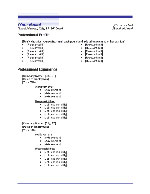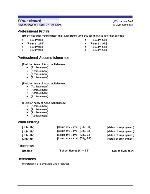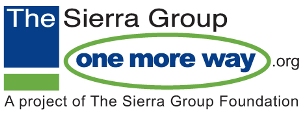 Use the One More Way™ Search Engine Powered by Google™ to find the disability information that you need.
Use the One More Way™ Search Engine Powered by Google™ to find the disability information that you need.Janet Fiore looks at the impact of the The ADA Amendments Act of 2008.
- Home
- Hiring Members
- Voc Rehab & Agency Members
- Job Seekers
- Sponsors
- Benefits of Membership
- Be Hired
- Search One More Way
- Faculty of Experts
- Press


What to know when you're looking for a job
When businesses look at a candidate and ask questions during an interview, they are trying to determine the Knowledge, Skills, and Abilities (KSAs) of that person. KSAs are the attributes required from a candidate to successfully perform a job and are generally demonstrated through qualifying service, education, or training. It’s important that you are able to appreciate the differences of these three topics so that you can focus your job search in an area that makes the most sense for you.
Let’s start with some definitions:
Knowledge – A body of information or understanding, usually factual or procedural, gained through experience or association. These would include formal education, training, certifications, or class work that you would have completed.
Skill – The proficient manual, verbal, or mental manipulation of data or things. It is desirable, quantifiable, and measurable; e.g., skill in typing, skill in operating a vehicle, skill in editing for transposed numbers. Simply put, these would be those things that at which you are good because of your repeated successful experiences.
Ability – The natural aptitude or acquired proficiency to perform an observable activity; e.g., ability to write reports, ability to lead or motivate others, ability to analyze numerical data, ability to plan and organize work.
Collectively, these three concepts can paint an accurate picture of what you can offer a potential employer. The trick is in relating them to an employer in the way that makes the best sense for that position.
 Writing
and communicating are sometimes very different things. This article offers
an insight on composing clear prose that convey unambiguous content PDF
Writing
and communicating are sometimes very different things. This article offers
an insight on composing clear prose that convey unambiguous content PDF ![]() -
55 K.
-
55 K.
Document Library:
Given the ease by which resumes can be circulated, the cover letter is more important now than ever before. The cover letter lets the HR Manager know that you are crafting your response to their exact need. Learn the mission critical questions that every cover letter must answer.
Words matter – especially to a search engine. Action words that convey power, persistence, and leadership matter most: Using these words only work if you are then able to back them up with practical examples. Learn the 10 words that every resume should have. CAUTION: Using these words only work if you are then able to back them up with practical examples.
The FIRST goal of resume distribution is not a job but an interview. Once you get the call for the interview do you know what to do to prepare? We believe that there are 8 questions that every candidate should ask themselves before an interview.
For most jobseekers, the job interview is generally viewed as a very simple win/lose process. Either you get the position or you don't. Nobody gets hired three-quarters of the way. Learn what to do when you don't get the offer.
Finding a job is easy when you know what it takes to succeed. While the work
is hard, the plan is manageable. Learn how to make the job search process work for you. ![]() PDF
- 133 K
PDF
- 133 K
There are three basic types of resumes:
1. Chronological: This is the most popular format. It places information in reverse chronological order (i.e. from most to least recent). Employers tend to prefer this format as it (hopefully) demonstrates a candidate’s steady and upward career growth. Thus, the focus is on time, job continuity, growth, and achievements. Click here for more information on Chronological resumes.
2. Functional: A functional resume focuses on skills, credentials, and accomplishments over the course of all jobs held. Emphasis is on what you did, not when or where you did it. Accomplishments, qualifications and experience are grouped together, to emphasize your experience in specialty areas. Click here for more information on Functional resumes.
3. Combination (Uses a Career Profile): A combination resume uses a career profile, which is a functional style listing of relevant skills and accomplishments, and then proceeds to describe employment and education histories in reverse chronological order. In other words, it is a combination of the above two concepts. The experience section directly supports the functional section. Click here for more information on Combination resumes.
NOTE: Unless a functional resume conveys your suitability significantly better than the other types, a chronological or combination format is suggested for entry-level positions. We recommend that you avoid using a functional resume unless an employer specifically requests that format.
Resume Templates:
Microsoft has templates for basic resumes. Please note that these templates require Microsoft Word 2000 or greater.
Chronological Resume Template:

Download a Chronological Resume template.
Functional Resume Template:

Download a Functional Resume template.
Find more templates for Microsoft Office programs.
Rate Your Resume:
 Does
your resume make the grade? Use this form to rate your resume or to allow your
friends to rate your resume. Grade the resume in each of the categories listed
as either Excellent, Average or Poor.
Does
your resume make the grade? Use this form to rate your resume or to allow your
friends to rate your resume. Grade the resume in each of the categories listed
as either Excellent, Average or Poor.
Download the Rate Your Resume PDF ![]() -
47 K.
-
47 K.
Contact Us:
Call us at:
1-888-492-2402
Email us at:
member@onemoreway.org
Write to us at:
The Sierra Group Foundation
One More Way Project
588 N. Gulph Road, Suite 110
King of Prussia, PA 19406
One More Way™ is an ‘open source’ program of The Sierra Group Foundation, a 501C(3) non-profit organization dedicated to driving up employment for Americans with Disabilities, including veterans.
 Powered through connections, The Sierra Group’s ONE MORE WAY Collaborative is a FREE, million member strong community. We serve job seekers, vocational rehabilitation professionals, and businesses. Together, we are driving up employment for Americans with disabilities, including veterans! Education, training, connections and more - BE SEEN, BE HEARD, BE HIRED!
Powered through connections, The Sierra Group’s ONE MORE WAY Collaborative is a FREE, million member strong community. We serve job seekers, vocational rehabilitation professionals, and businesses. Together, we are driving up employment for Americans with disabilities, including veterans! Education, training, connections and more - BE SEEN, BE HEARD, BE HIRED! 